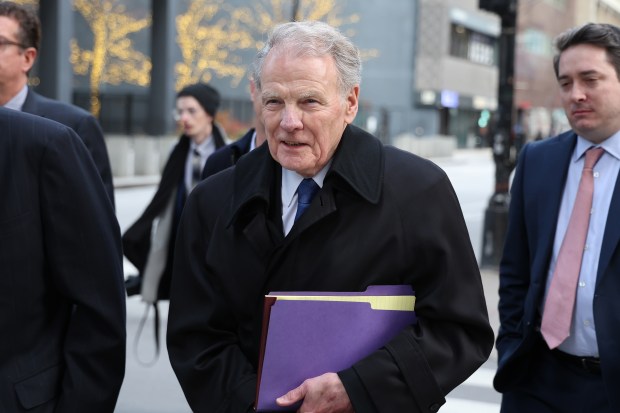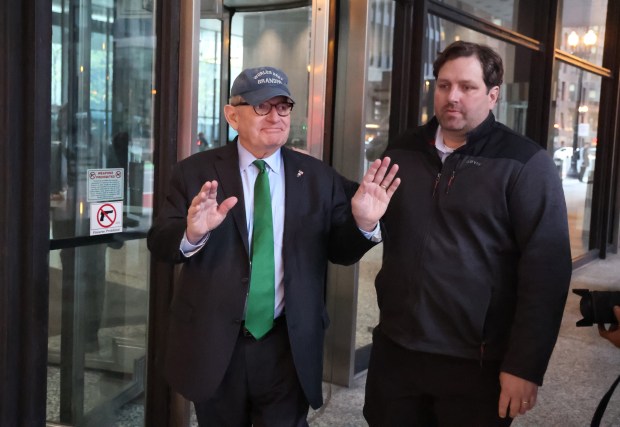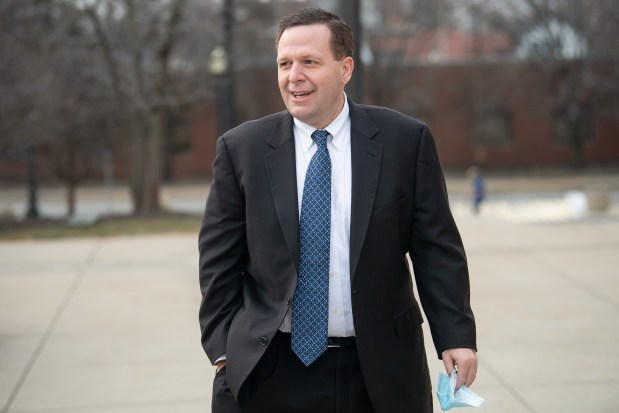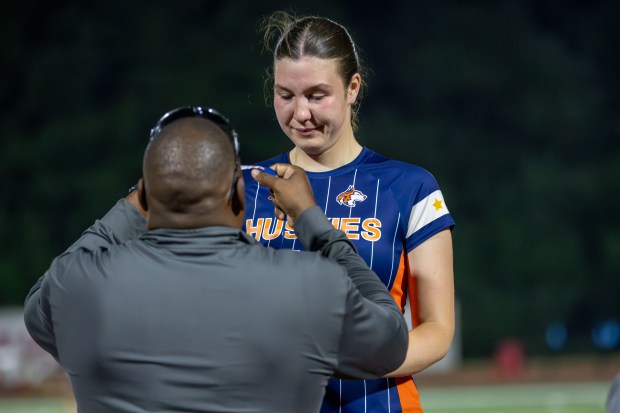Illinois House Speaker Michael Madigan was the state’s most powerful politician in 2018 when he allegedly met at his downtown Chicago law office with then-Ald. Danny Solis to discuss Solis’ appointment to a lucrative state board position.
Solis, who unbeknownst to Madigan was an FBI mole, made it clear he’d helped bring law business to Madigan and wanted something in return once he retired from City Hall, perhaps a position with the Commerce Commission or Labor Relations Board, which Solis said were both “very generous in their compensation,” according to federal prosecutors.
“Don’t worry about it,” Madigan allegedly said during the conversation, which was secretly being videotaped by Solis. “…Just leave it in my hands.”
That Aug. 2, 2018, exchange, which is a key moment in the sprawling case against Madigan, is charged under a statute that makes it a crime to reward a public official for an official act, regardless of any prior quid pro quo.
Or does it?
On Monday, the U.S. Supreme is set to hear oral arguments in a case challenging the very statute that Madigan was charged under for the Solis episode, which is commonly referred to as “666” because of its number in the federal criminal code.
How the high court comes down could have a resounding impact on political corruption prosecutions in Illinois — including the case against Madigan set for trial in October.
The case involves James Snyder, the former mayor of Portage, Indiana, who was convicted under the same bribery statute of taking a $13,000 “consulting” fee from a garbage truck contractor that had recently won two lucrative contracts with the town.
Snyder’s lawyers have argued it wasn’t a bribe at all, but a legal thank-you gesture, not unlike sending a fruit basket to a politician at holiday time in appreciation for their work. In their brief to the Supreme Court earlier this year, Snyder’s attorneys said the interpretation of the law by Chicago’s appellate court differs starkly from other districts and potentially criminalizes all sorts of otherwise innocuous behavior.
“Giving playoff tickets to your kids’ hockey-loving orthodontist as thanks for straightened teeth should not risk prison time,” the petitioners wrote.
But federal prosecutors have said the plain language of the statute, which bars someone from “corruptly” soliciting or receiving something over $5,000 in value “intending to be influenced or rewarded,” leaves no question that doling out rewards to a politician for an official act is a type of “pernicious graft” that Congress clearly wanted to outlaw.
“As lawmakers have recognized for centuries, corrupt gratuities give rise to deceitful behavior by their recipients, who may carry out their duties in a way designed to maximize the rewards to themselves instead of to the local government or other federally funded entity they serve,” attorneys for the government wrote in their response brief last month.
Oral arguments are set for 9 a.m. Chicago time in Washington D.C., with audio being live streamed on the Supreme Court’s website. The court is expected to render a decision by late June.
The high court’s decision to hear Snyder’s case has already had repercussions in Chicago. Since the Supreme Court’s announcement in December, Madigan’s trial was delayed from April 1 until October to allow time for the decision to come out and be digested before going forward.
In a parallel case, a different judge agreed, over the objection of prosecutors, to delay sentencings for the “ComEd Four,” a group of lobbyists and executives convicted of conspiring to bribe Madigan by showering his associates with do-nothing consulting jobs and other perks.
In Madigan’s case, prosecutors have noted that the 666 statute is charged in only five of the 23 counts of the racketeering indictment.

In addition to the Solis board appointment, the statute is used to charge an alleged scheme to steer a ComEd board seat to Democratic political operative Juan Ochoa, payments ComEd made to former 13th Ward Ald. Frank Olivo, former 23rd Ward Ald. Michael Zalewski, and others, and an alleged push by Madigan to win law business from the developers of a parcel in Chinatown.
In their objection to delaying the trial, prosecutors said they were willing to forgo any argument to the jury that the benefits provided to Madigan “were gratuities, that is, merely rewards for past actions Madigan had already committed to take.”
U.S. District Judge John Robert Blakey sided with Madigan’s team, however, saying “it’s better to do it right than to do it twice.”
Madigan, 81, is charged in a racketeering indictment alleging he participated in an array of bribery and extortion schemes from 2011 to 2019 aimed at using the power of his public office for personal and political gain.

Also charged was Madigan’s longtime confidant Michael McClain, 76, a former state legislator and lobbyist who was convicted in the ComEd Four trial last year of orchestrating an alleged scheme by the utility giant to secretly steer hundreds of thousands of dollars to Madigan-backed operatives.
Madigan and McClain have each pleaded not guilty in their case, which is set to begin on Oct. 8.
Meanwhile, Chicago’s legal community will watch in earnest how the Snyder case unfolds before the Supreme Court.
In their latest filing on April 2, Snyder’s attorneys continue to make the case that the line between “benign” gifts and illegal rewards is murky at best.
“But what about tickets to a high-school football game? A college basketball game? The (Taylor Swift) Eras Tour? Where a gratuity crosses the line from ‘benign’ to ‘immoral or ‘gives rise to deceitful behavior’ is anyone’s guess,” the filing stated.
Evidence at Snyder’s trial showed that shortly after he helped steer contracts for city garbage trucks to a local firm, Great Lakes Peterbilt, a cash-strapped Snyder showed up at the business asking for a $15,000 loan.
The firm’s president eventually agreed to pay Snyder $13,000, supposedly for contract work involving information technology and human resources consulting, work that Snyder was not qualified to do and never performed.
Snyder’s attorneys argued in their briefs that prosecutors have used the 666 statute to “suspend a Sword of Damocles over millions of citizens’ heads” by repackaging “everyday gift-giving” as a federal crime.
In response, lawyers for the prosecution accused Snyder of offering “a hypothetical parade
of horribles” without citing a single case where prosecutors had charged such innocuous conduct in the 40-year history of the 666 statute.
“(Snyder’s) focus on hypotheticals overlooks the very real harm that gratuities inflict, and that Congress chose to legislate against,” their brief stated. “Contrary to petitioner’s repeated suggestion, gratuities are not simply a ‘lesser-included offense’ of bribery, which includes conduct that would not be a gratuity. Instead, gratuities are a different type of pernicious graft.”
However the Supreme Court lands, the decision is expected to finally resolve an entrenched, 5-2 split among U.S. circuits on the issue.
Jackie Bennett Jr., who represented Snyder against the bribery charges in Indiana federal court, told the Tribune in January that he was “not surprised” that the Supreme Court agreed to take the case.
“In 20 states and Puerto Rico, the law is one thing. In eight states, they adopted the position we argued in Mr. Snyder’s case. It’s an irreconcilable difference,” Bennett said. “What Snyder did in Portage should not be regarded as a crime.”
jmeisner@chicagotribune.com
alavalley@chicagotribune.com




